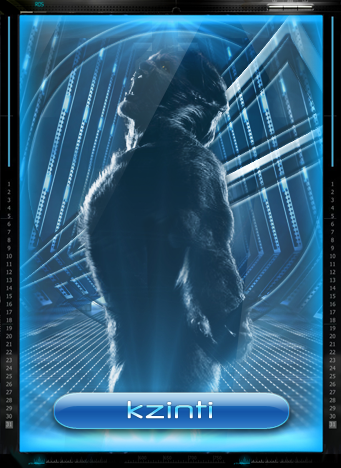Kzinti
From Star Trek: Theurgy Wiki
UNDER CONSTRUCTION
Physiology
Kzin are larger than Humans, a large male Kzin may be eight feet tall and weigh nearly 500 pounds. They are bipeds, standing erect on short, digitgrade legs. Most have bright orange fur with individualized black markings, which most commonly appear on the face and hands but specimens with full black fur with about ten times the regularity of albinism in Humans. They are powerfully built, with thick limbs and torso. Although mammalian they do not have a mammal-like rib cage. Instead they have a latticework of bone struts encasing their torso, connected by cartilage. Kzinti also possess two hearts to regulate their cardiovascular systems.
The head is quite cat-like in appearance, although with a large cranial bulge. Their eyes are strangely colored, with round pupils instead of cat-like vertical ones. Their fan-like ears fold like Chinese parasols. They have long, whip-like tails. Their hands end in three thick fingers and an opposable thumb, all possessing fully retractable claws, while their feet have three toes, also with retractable claws, and a dewclaw.
The Kzinti homeworld has a gravity approximately 1.2 times that of the Earth which contributes greatly to their size and strength.
Female Kzinti are only semi-intelligent (or at least non-verbal) and are kept closely guarded in harems. Kzinti females are in heat only when fertile, and Kzinti generally engage in sex solely for reproduction.
Kzinti are exclusively carnivorous to the point that they are incapable of digesting plant matter primary due to a lack of the necessary enzymes in their digestive track to break down the cellulose structure. Kzinti and Human biochemistry are very similar; they can eat Humans without allergic reaction, and gain nourishment from the meat.
Psychology
Kzinti are, on average, slightly less intelligent than humans, although some members of the species are exceptions to that stereotype. Aggressive and territorial, kzinti have much more need of "elbow room" than do humans.
When time permits they frequently perform grooming, such as brushing their fur.
Language
The written script is based on claw-carvings in wood and is often described as 'dots and commas' by humans.
The language, itself, sounds clashing and terrible to human ears, but is in fact pitched and cased with several modes; mode being dependent upon who you are talking to. Although there is only one main language (the Heroes' Tongue), it has many modes including Mocking, Deferential, Technical and Royal, which is only spoken to and by royalty(the Patriarch and his kin). A human with plenty of spit and a good falsetto can learn the basic mode of the H. T. and be understood anywhere, but pronunciation will be difficult; similarly Kzinti can learn to speak Terran with some difficulty.
Kzinti count in octal, which means decimal-ten is represented a o12, d100 as o144 and so on.
Body language is, of course, very different from that of humans. A list of kzinti expressions and gestures follows:
| Emotion | Manifestation |
|---|---|
| Worry | A flattening of the fur |
| Frustration | Open-shut flare of nostrils, ticking noise from throat |
| Readiness | Ears laid flat |
| 'smile' | Twitching of ears |
| Slyness | Slight lidding of eyelids; could also mean calculating thought |
| Laughter | Twitching of ear & tail |
| Dismissive shrug | Yawn |
| Puzzlement | Careful sniffs of air, slight raise of muzzle |
| Threat | Bearing of teeth/fangs |
| Salute | Claw rake in front of own face. |
The tail is a great indicator of a kzin's mood. A lashing tail signifies worry. A dragging tail shows depression, a raised tail happiness. If the kzin's tail is hidden between it's legs, it is badly frightened. A slow, teasing motion of a kzinrret's tail-tip is considered extremely sexy by males, as is a cool, defiant stare.
The ears, too are highly expressive - a twitching indicates amusement, laid flat they indicate nervousness or readiness; and fanned out they indicate intent concentration or alertness. Sitting, standing or lying down with the legs splayed is considered obscene in both males and females.
Body language is also important in social encounters. Those of lower social status keep their eyes averted, except when challenging (and that in its correct place). Submission is signaled by covering of nose with paws, prostrating oneself or, in extreme circumstances, exposing belly and throat. A kzin who is about to attack or challenge will often adopt a threatening posture. The ears fold back to prevent them from being ripped or torn, the fur bottles out to hide the shape of the flesh, the tail becomes stiff and erect, ready to whip an opponents legs from under him. The lips pull back from the fangs in challenge, and the claws emerge ready for a fight. A kzin in this posture is about one second away from screaming and leaping - a favoured method of attack.
Kzinti also use scent a lot. They scent-mark with glands in cheeks and hands, occasionally using their urine. Their hormones are far more active than humans: a gingery smell signals excitement - either anger or fear.
See also: Lexicon
Home World
The Kzinti homeworld orbits the star 61 Ursae Majoris at a distance somewhat greater than that at which Earth orbits the sun. It is a larger world, with gravity 1.55 times that of Earth's. Its year is roughly one and a half times longer than Earth's, and its day is 27 hrs and 36 minutes long. The climate of this world is cooler and drier than Earth's, and since it has a definite axial tilt it also has seasons. It receives less light from it's star, which is redder than Sol; and is consequently dimmer.
The Kzinti refer to this world only as "Homeworld": it has no other name.

